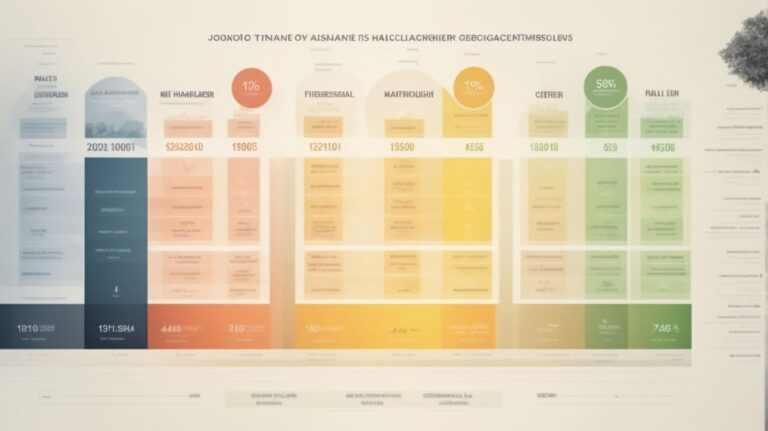Have you ever wondered why certain sales strategies work better than others? The answer may lie in the fascinating world of sales psychology.
In this article, we will explore the basic principles of sales psychology, the different types of sales strategies, and the psychological techniques used to influence potential customers. From social proof to emotional appeals, understanding the role of psychology in sales can give you a competitive edge in the business world.
So, grab a cup of coffee and get ready to dive into the fascinating world of sales psychology!
Contents
- 1 Key Takeaways:
- 2 What Is Sales Psychology?
- 3 How Does Psychology Affect Sales?
- 4 What Are The Different Types of Sales Strategies?
- 5 What Are The Psychological Techniques Used In Sales Strategies?
- 6 Frequently Asked Questions
- 6.1 What is the role of psychology in sales strategies?
- 6.2 How does understanding human behavior benefit sales strategies?
- 6.3 Can psychology be used to manipulate customers?
- 6.4 What are some psychological techniques used in sales strategies?
- 6.5 How can salespeople use psychology to overcome objections?
- 6.6 Is it necessary for salespeople to have a background in psychology?
Key Takeaways:
What Is Sales Psychology?
Sales psychology explores the intricate relationship between human behavior and the sales process, diving into the underlying emotional needs and cognitive factors that influence customers’ buying decisions when considering products and services.
Understanding the psychological aspects of sales aids in creating effective marketing strategies and enhancing customer experiences.
By comprehending the emotional triggers and preferences of the target audience, businesses can tailor their branding and messaging to resonate with potential buyers on a deeper level.
By analyzing consumer behavior and decision-making patterns, companies can refine their sales techniques and optimize their offerings to better fulfill customer needs.
How Does Psychology Affect Sales?
The influence of psychology on sales success is profound, as it directly correlates with understanding the emotional needs and triggers of the target audience, enabling sales professionals to form an impactful and lasting connection based on psychological principles.
By diving into the psychological aspects of consumer behavior, sales professionals can adapt their approaches to cater to the innate emotional drivers influencing purchasing decisions. This involves recognizing the cognitive biases and emotional motivations that underpin consumer choices, thus allowing for more targeted and persuasive sales strategies.
Harnessing the power of psychology in sales give the power tos professionals to create genuine rapport and trust with their customers, enriching the overall sales experience. Understanding the intricacies of human emotions and behavioral patterns becomes a cornerstone in building long-term relationships and fostering loyalty, ultimately leading to sustained sales growth and customer satisfaction.
What Are The Basic Principles of Sales Psychology?
The basic principles of sales psychology revolve around creating strong emotional connections, understanding human behavior, and utilizing influential human factors to effectively guide and influence buying decisions.
Understanding the emotional triggers and motivations of consumers is essential to establishing a robust bond that resonates with their desires and aspirations. By tapping into these emotional connections, sales professionals can tailor their approach to align with the customer’s emotional needs, ultimately fostering loyalty and trust.
Gaining insights into human behavior enables sales teams to predict and navigate consumer responses, enhancing the effectiveness of sales strategies. Leveraging human factors such as social proof, reciprocity, and authority can significantly impact purchasing behavior, creating a compelling influence on consumer decision-making.
What Are The Different Types of Sales Strategies?
Sales strategies encompass a diverse range of approaches tailored for different scenarios, including B2B and B2C sales, with a keen focus on understanding and leveraging buyer psychology to drive successful outcomes.
For B2B sales, the strategies often involve a longer sales cycle, complex decision-making processes, and the need to appeal to multiple stakeholders within the organization.
In contrast, B2C sales may require more rapid, emotionally-driven tactics to capture the attention and interest of individual consumers.
Understanding buyer psychology plays a pivotal role in crafting effective sales strategies. Whether in a B2B or B2C context, recognizing the motivations, pain points, and triggers that influence purchasing decisions give the power tos sales professionals to tailor their approaches for greater impact.
Direct Sales
Direct sales involve direct interactions between sales reps and potential customers, often leveraging psychological triggers and advanced sales techniques to secure commitments and drive conversions.
This form of selling focuses on building personal relationships with customers, understanding their needs, and tailoring the sales approach accordingly.
Sales reps play a pivotal role in this process, using their communication skills and product knowledge to influence customer decisions. Utilizing psychological triggers, such as reciprocity, social proof, and scarcity, is a common practice in direct sales to nudge potential customers towards making a purchase.
Advanced sales techniques like solution selling and consultative selling are employed to provide a seamless and valuable buying experience, thus enhancing customer satisfaction and loyalty.
Consultative Sales
Consultative sales thrive on establishing emotional connections, understanding customer demographics, and wielding influence to guide clients through a personalized and impactful sales journey.
These sales endeavors revolve around empathy, where the sales professional deeply comprehends the customer’s needs, desires, and pain points, forming a profound emotional bond.
By diving into the depths of various customer demographics, such as age, gender, occupation, and lifestyle, sales professionals gain insights that help tailor the sales process to resonate with diverse clientele.
Fueled by a nuanced understanding of psychological triggers and behavioral cues, consultative sales professionals are adept at influencing customer decisions without resorting to pressure tactics.
Rather, they craft engaging narratives and compelling propositions that draw customers in, fostering a sense of trust and partnership throughout the sales journey.
Solution Sales
Solution sales involve cognitive restructuring, strategic influencer marketing, and an understanding of the psychology of choice to present tailored solutions that resonate deeply with clients’ needs and aspirations.
Cognitive restructuring in solution sales entails reshaping the clients’ perspectives and beliefs about their challenges and needs, helping them see possibilities and opportunities with the proposed solutions.
Strategic influencer marketing leverages trusted voices and industry authorities to validate and amplify the value of the offered solutions, building credibility and fostering trust.
Understanding the psychology of choice enables sales professionals to frame options and recommendations in ways that align with clients’ decision-making processes, fostering resonance and enhancing the likelihood of a meaningful connection with the solutions proposed.
Relationship Sales
Relationship sales center around fostering genuine emotional connections, establishing authority, and leveraging social proof to build enduring and compelling relationships with clients, driving sustainable sales success.
By nurturing emotionally resonant connections, sales professionals can deepen client relationships, fostering trust and loyalty.
Establishing authority positions them as trusted advisors, offering valuable insights and solutions.
Utilizing social proof through testimonials, case studies, and endorsements reinforces the perceived value of the product or service, further solidifying the client’s trust.
Ultimately, these aspects of relationship sales create a strong foundation for long-term partnerships and repeat business.
Transactional Sales
Transactional sales leverage the scarcity principle, commitment consistency, and the principles of unity marketing to drive swift yet impactful transactions, optimizing the balance between urgency and customer commitment.
The scarcity principle, a fundamental tenet of transactional sales, creates a sense of urgency and value by offering limited-time or limited-quantity deals. This prompts customers to act swiftly.
Commitment consistency, on the other hand, fosters loyalty and repeat transactions by ensuring that promises and agreements are consistently honored. This builds trust and reliability.
Unity marketing strategies seek to create a cohesive brand experience across different channels. This provides a seamless and unified journey for customers, further enhancing the transactional process.
What Are The Psychological Techniques Used In Sales Strategies?
Sales strategies employ an array of psychological techniques, including compelling emotional appeals, interpretation of non-verbal cues, and the application of the DISC assessment model to foster impactful and resonant sales interactions.
Emotional appeals are effectively utilized to connect with the customer’s desires, concerns, and aspirations. This taps into their motivations and enhances the resonance of the sales message.
Non-verbal cues, such as body language and facial expressions, provide valuable insights into a prospect’s receptiveness and engagement. This allows sales professionals to adapt their approach accordingly.
The DISC assessment model aids in understanding the behavioral tendencies of individuals. This enables sales representatives to tailor their communication and sales strategies to align with the preferences and characteristics of their prospects.
Social Proof
Social proof involves leveraging the principles of liking, authority, and social proof to substantiate the value and credibility of products and services, fostering confidence and trust among potential customers.
This strategy operates on the psychological phenomenon that people tend to rely on the actions and feedback from others when making decisions.
By showcasing positive reviews, testimonials, or endorsements, businesses can reinforce their reputation and influence the decision-making process of their target audience.
The principle of liking plays a significant role, as individuals are more likely to trust and follow the actions of people they admire or find relatable.
Authority figures, experts, or influencers can significantly impact consumer behavior, as their validation and endorsement lend credibility and confidence to a product or service.
Scarcity
Scarcity leverages the scarcity principle and establishes emotional connections to create a sense of urgency, compelling buyers in both B2B and B2C sales scenarios to make timely and decisive purchasing decisions.
By leveraging scarcity, businesses can tap into the innate human psychology that places a premium on items or opportunities that are perceived as rare or limited.
This principle holds immense power in nudging potential customers towards making a purchase they might otherwise have delayed or overlooked. Scarcity creates a fear of missing out, triggering an emotional response that prompts swift and decisive action.
When effectively utilized, scarcity enhances the perceived value of products or services, leading to increased demand and sales. Incorporating scarcity into sales strategies results in a win-win situation for both businesses and customers, driving conversions while satisfying the buyer’s desire for exclusivity and urgency.
Authority
Authority in sales revolves around establishing credibility and influence, drawing on the principles of authority and the liking principle to resonate with buyer psychology and drive confident purchasing decisions.
When a salesperson or a brand is perceived as an authority in their industry, customers are more likely to trust their expertise and recommendations. This trust is built through consistent delivery of valuable and accurate information, fostering a sense of authenticity and reliability.
The liking principle, based on the idea that people are more likely to say yes to those they know and like, plays a crucial role in establishing a connection with potential buyers. By leveraging these psychological triggers, sales professionals can create an environment where consumers feel confident and informed, leading to more successful transactions.
Reciprocity
Reciprocity harnesses the reciprocity principle to fulfill emotional needs and cater to specific customer demographics, fostering a sense of mutual benefit and driving positive interactions in the sales process.
By prioritizing the reciprocity principle, sales professionals can build trust and rapport with customers by understanding their unique emotional drivers and tailoring their approach accordingly.
The tailored approach acknowledges the diverse demographics of customers, ensuring that their individual preferences and needs are met, thus strengthening the bond between the customer and the salesperson. This personalized interaction fosters a positive association between the customer and the brand, enhancing loyalty and ultimately driving sales success.
Consistency
Consistency in sales centers around commitment consistency and cognitive restructuring, paving the way for influential sales interactions that align with the psychological principles of commitment and decision-making.
Commitment consistency in sales involves delivering on promises, maintaining a steady level of effort and dedication, and building trust with clients over time. This trust forms the foundation for lasting relationships and repeat business.
Meanwhile, cognitive restructuring allows sales professionals to adapt their mindset, understanding, and approach to better connect with potential clients, anticipate their needs, and make persuasive pitches. By integrating these principles into their sales strategies, professionals can foster fruitful, long-term relationships with their clients, enhancing their overall sales performance.
Anchoring
Anchoring employs the anchoring effect and leverages the psychology of selling to establish emotional connections and guide customers towards favorable perceptions and decisions in the sales context.
The anchoring effect is a cognitive bias where individuals rely heavily on the first piece of information offered (the “anchor”) when making decisions. In sales, this could be a product’s initial price or a key feature highlighted during a presentation.
Understanding the psychology of selling involves grasping the emotional and psychological triggers that influence purchasing behavior. By anchoring favorable attributes or benefits of a product, sales professionals can shape customer perceptions and create a positive and lasting impression.
Framing
Framing utilizes the framing effect and resonant emotional responses, often intertwined with influencer marketing strategies, to shape perceptions and perspectives in the sales landscape, driving favorable customer outcomes.
By incorporating framing techniques, sales professionals strategically modify the presentation of information to evoke specific customer responses and behaviors. This involves creating a context that elicits particular emotional reactions, influencing how individuals interpret a given scenario.
When leveraged in conjunction with influencer marketing approaches, these framing effects can have a magnified impact as the messaging is disseminated through trusted and charismatic sources, further shaping consumer perceptions and purchasing decisions.
Emotional Appeals
Emotional appeals leverage a deep understanding of emotional needs and connections, intertwining with the psychology of choice to craft compelling narratives and engagements that resonate authentically with customers.
This approach recognizes that purchasing decisions are often driven by emotions rather than logic. By tapping into emotional needs and connections, sales strategies can form a strong bond with customers and establish a deeper, more meaningful relationship.
When individuals feel a genuine emotional connection with a brand or product, they are more likely to engage, trust, and remain loyal. Understanding the psychology of choice further allows businesses to tailor their messaging and offerings in a way that aligns with customers’ emotional triggers, resulting in a more effective and resonant sales approach.
Frequently Asked Questions
What is the role of psychology in sales strategies?
Psychology plays a crucial role in sales strategies as it helps understand the behaviors and motivations of potential customers, and enables salespeople to tailor their approach accordingly.
How does understanding human behavior benefit sales strategies?
Understanding human behavior allows salespeople to anticipate and respond to their customers’ needs, build trust and rapport, and ultimately increase the chances of making a successful sale.
Can psychology be used to manipulate customers?
While some unethical salespeople may try to manipulate customers, the use of psychology in sales strategies is primarily aimed at understanding and meeting the needs of customers in an ethical and effective manner.
What are some psychological techniques used in sales strategies?
Some common psychological techniques used in sales strategies include building rapport, using social proof, scarcity and urgency tactics, and creating a sense of reciprocity.
How can salespeople use psychology to overcome objections?
By understanding the psychological reasons behind objections, salespeople can address them more effectively and build trust with their customers, ultimately increasing the chances of closing a sale.
Is it necessary for salespeople to have a background in psychology?
While a background in psychology can certainly be beneficial for salespeople, it is not a requirement. However, having a basic understanding of human behavior and psychology can greatly improve sales strategies and success.



